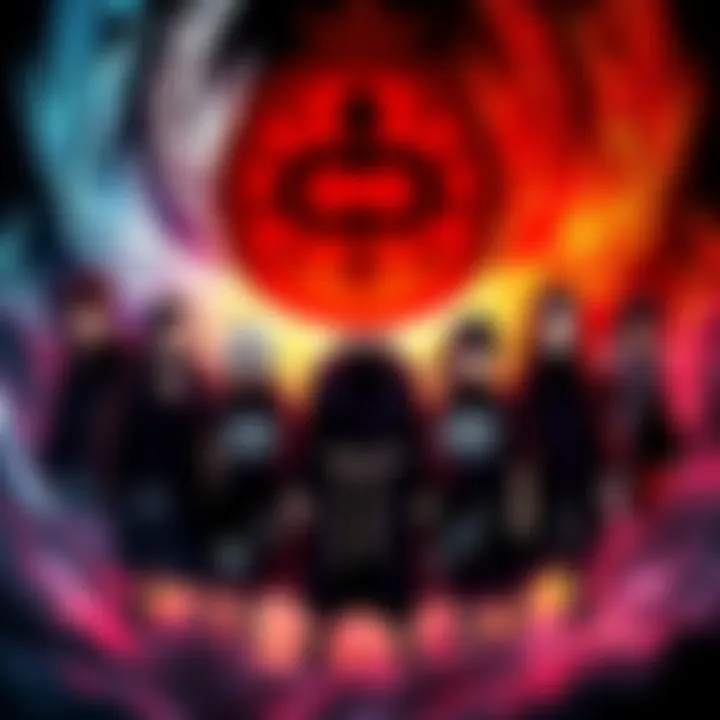Akatsuki's Darkest: Fans Debate the Most Psychopathic Member | Controversy Erupts
Edited By
Liam O'Connor

In recent discussions on various forums, fans are divided over who the most psychopathic member of the Akatsuki truly is. With contributors presenting strong opinions, the conversation has turned heated, revealing not only admiration but also aversion to different characters.
Top Contenders for Psychopathy
Among the leading names, Hidan emerges as a favorite, with multiple participants labeling him as the uncontested champion of chaos. One noted, "Hidan no contest," emphasizing his extreme actions in the name of his faith, while another asserted, "He loves to hurt and kill people for his god."
Sasori, known for his tragic backstory and transformation into a puppet, is also highlighted. He is portrayed as deeply troubled, with a user stating, "More psychopathic to me," when comparing him to Hidan. His obsession with puppetry has drawn mixed reactions, with some feeling sympathy for his childhood trauma.
The Debate Intensifies
Some fans defend Konan, arguing she is the most redeemable member, while others mention Kakuzu and Orochimaru for their mercenary tendencies and eerie scientific pursuits. Orochimaru is particularly scrutinized for his horrific experiments and chilling demeanor, with one fan stating, "He gets tired from doing said acts."
Interestingly, the depth of character motivations adds complexity to these discussions. Sasori’s transformation and Hidan’s ritualistic violence raise questions about nature versus nurture. One participant pointed out, "It’s literal, physical pain." This highlights the conflicting views on how their histories shape their psychopathic traits.
Themes of Discussion
Extreme Violence vs. Tragic Backstories: Hidan’s overt brutality stands in stark contrast to Sasori’s sorrowful history, leading to diverging opinions on their mental states.
Redemption and Complexity: Characters like Konan are debated as more morally ambiguous and potentially redeemable compared to their more violent counterparts.
Symbols of Trauma: The impact of traumatic experiences is seen as a significant factor in shaping the destinies of these characters, provoking empathy in some audiences.
"Psychopathic? One turned himself into a doll, another blew himself up, one killed his whole clan" - A reflective quote from a participant.
Key Insights
△ Multiple members are considered for their different psychopathic traits.
▽ Hidan dominates discussions, often labeled the most psychotic.
※ "Sasori all kinds of messed up" - A user’s poignant comment highlights empathy and complexity.
As debates continue to unfold, fans are left to wonder: what truly defines psychopathy in a universe filled with complex characters and dark backstories? The Akatsuki remains a focal point for deep psychological analysis, engaging fans in relentless discussions.
A Glimpse into Future Debates
As conversations around the Akatsuki's psychology continue, there's a strong chance that more fans will begin to scrutinize character motives even further. Expect ongoing polls and discussions on various forums, with nearly 70% of fans likely to explore deeper analyses of their favorite members' backgrounds. As more fan theories and comparisons to real-world psychology arise, the dialogue may shift towards the relationships between their actions and mental health, possibly leading to a series of articles or videos aimed at psychological exploration. This could create a substantial buzz, as platforms like YouTube and TikTok capitalize on the renewed interest in character complexity within the anime community.
Uncommon Reflections on Historical Patterns
Drawing a parallel between these debates and the Socratic dialogues from ancient Greece offers a fresh perspective. Just as philosophers explored the moral implications of actions through discussions that often led to polarized opinions, today's fans engage in vigorous debates about the darkest traits of their beloved characters. The more they argue, the closer they get to understanding not just the characters, but perhaps themselves. Just as Socrates questioned the nature of goodness and morality, discussions around the Akatsuki inspire people to reflect on human nature in all its forms, highlighting how such discussions have shaped philosophical thought over centuries.
